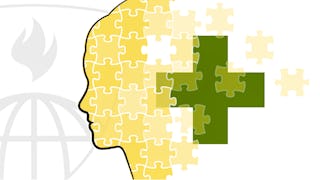- Browse
- Therapy
Therapy Courses
Therapy courses can help you learn various therapeutic approaches, communication techniques, and psychological assessment methods. You can build skills in active listening, empathy, and developing treatment plans tailored to individual needs. Many courses introduce tools such as cognitive-behavioral therapy frameworks, mindfulness practices, and assessment instruments, that support effectively applying these skills in real-world settings.
Popular Therapy Courses and Certifications
 Status: PreviewPreviewU
Status: PreviewPreviewUUniversity of Toronto
Skills you'll gain: Patient Education And Counseling, Patient Evaluation, Interpersonal Communications, Psychotherapy, Mental Health Therapies, Patient Treatment, Treatment Planning, Rapport Building, Interactive Learning, Mental Health Diseases and Disorders, Case Studies, Mental Health, Clinical Practices
4.8·Rating, 4.8 out of 5 stars94 reviewsMixed · Course · 1 - 3 Months
 Status: Free TrialFree TrialW
Status: Free TrialFree TrialWWesleyan University
Skills you'll gain: Motivational Interviewing, Cognitive Behavioral Therapy, Mental Health Therapies, Behavioral Health, Mental and Behavioral Health, Psychotherapy, Psychology, Experimentation, Health Education, Goal Setting
4.8·Rating, 4.8 out of 5 stars192 reviewsBeginner · Course · 1 - 4 Weeks
 Status: PreviewPreviewJ
Status: PreviewPreviewJJohns Hopkins University
Skills you'll gain: Triage, Crisis Intervention, Active Listening, Rapport Building, Emergency Response, First Aid, Psychiatric Assessments, Interpersonal Communications, Mental Health, Stress Management, Rehabilitation, Patient Referral, Empathy & Emotional Intelligence, Community Development
4.8·Rating, 4.8 out of 5 stars20K reviewsMixed · Course · 1 - 3 Months
 Status: PreviewPreviewY
Status: PreviewPreviewYYale University
Skills you'll gain: Psychology, Child Development, Psychiatry, Mental Health, Human Development, Human Learning, Social Sciences, Behavioral Health, Sociology, Neurology, Critical Thinking, Scientific Methods, Problem Solving
4.9·Rating, 4.9 out of 5 stars32K reviewsBeginner · Course · 1 - 3 Months
 Status: PreviewPreviewU
Status: PreviewPreviewUUniversity of Florida
Skills you'll gain: Journals, Music, Performing Arts, Mindfulness, Empowerment, Storytelling, Personal Development, Liberal Arts, Self-Awareness, Emotional Intelligence, Writing
4.6·Rating, 4.6 out of 5 stars995 reviewsMixed · Course · 1 - 3 Months
 Status: Free TrialFree TrialW
Status: Free TrialFree TrialWWesleyan University
Skills you'll gain: Motivational Interviewing, Psychological Evaluations, Cognitive Behavioral Therapy, Mental Health Diseases and Disorders, Mental Health Therapies, Behavioral Health, Mental and Behavioral Health, Psychiatry, Psychotherapy, Clinical Psychology, Mental Health, Cultural Diversity, Psychiatric Assessments, Psychology, Experimentation, Health Education, Interpersonal Communications, Culture, Clinical Assessment, Goal Setting
4.8·Rating, 4.8 out of 5 stars729 reviewsBeginner · Specialization · 3 - 6 Months
What brings you to Coursera today?
 Status: Free TrialFree TrialU
Status: Free TrialFree TrialUUniversity of Minnesota
Skills you'll gain: Contraindication, Pain Management, Nursing Practices, Clinical Practices, Patient Safety, Clinical Research, Stress Management, Patient Education And Counseling, Regulatory Compliance, Science and Research
4.9·Rating, 4.9 out of 5 stars503 reviewsBeginner · Course · 1 - 3 Months
 Status: Free TrialFree TrialA
Status: Free TrialFree TrialAAmerican Psychological Association
Skills you'll gain: Substance Abuse, Mental Health Diseases and Disorders, Clinical Psychology, Mental and Behavioral Health, Psychiatry, Psychological Evaluations, Mental Health, Cognitive Behavioral Therapy, Patient Evaluation, Diagnostic Tests, Behavioral Health, Psychotherapy, Psychiatric Assessments, Cultural Diversity, Epidemiology, Pharmacology, Neurology, Demography, Psychology, Pharmacotherapy
4.8·Rating, 4.8 out of 5 stars289 reviewsBeginner · Specialization · 3 - 6 Months
 Status: PreviewPreviewU
Status: PreviewPreviewUUniversity of Toronto
Skills you'll gain: Sports Medicine, Physical Therapy, Injury Prevention, Exercise Science, Preventative Care, Health Education, Pain Management, Rehabilitation, Cardiology, Orthopedics, Oncology
4.7·Rating, 4.7 out of 5 stars802 reviewsBeginner · Course · 1 - 3 Months
 Y
YYale University
Skills you'll gain: Human Musculoskeletal System, Anatomy, Orthopedics, Kinesiology, Patient Positioning, Neurology, Physical Therapy
4.9·Rating, 4.9 out of 5 stars102 reviewsIntermediate · Course · 1 - 3 Months
 Status: FreeFreeU
Status: FreeFreeUUniversity of Michigan
Skills you'll gain: Constructive Feedback, Clinical Supervision, Clinical Assessment, Clinical Practices, Patient Evaluation, Patient Safety, Teamwork, Trustworthiness
4.7·Rating, 4.7 out of 5 stars799 reviewsIntermediate · Course · 1 - 3 Months
 Status: PreviewPreviewT
Status: PreviewPreviewTThe Museum of Modern Art
Skills you'll gain: Compassion, Self-Awareness, Creativity, Personal Development, Empathy, Optimism, Mental Health, Mindfulness, Emotional Intelligence, Curiosity, Stress Management, Cultural Diversity, Storytelling
4.9·Rating, 4.9 out of 5 stars23 reviewsBeginner · Course · 1 - 3 Months
In summary, here are 10 of our most popular therapy courses
- Learn Interpersonal Psychotherapy: University of Toronto
- Creating Behavioral Change: Wesleyan University
- Psychological First Aid: Johns Hopkins University
- Introduction to Psychology : Yale University
- Healing with the Arts: University of Florida
- Abnormal Psychology: Wesleyan University
- Aromatherapy: Clinical Use of Essential Oils: University of Minnesota
- Psychology of Anxiety, Mood, Substance Use, and Addictive Behaviors: American Psychological Association
- Managing Your Health: The Role of Physical Therapy and Exercise: University of Toronto
- Anatomy of the Upper and Lower Extremities : Yale University
Frequently Asked Questions about Therapy
Therapy encompasses a range of practices aimed at improving mental, emotional, and physical well-being. It is important because it provides individuals with tools to cope with life's challenges, enhances self-awareness, and fosters personal growth. Therapy can address various issues, including anxiety, depression, relationship problems, and trauma, making it a vital resource for many seeking support.
A career in therapy can lead to various roles, including licensed therapist, counselor, clinical psychologist, social worker, and marriage and family therapist. Each position may require different levels of education and certification, but all contribute to helping individuals navigate their mental health and emotional challenges.
To pursue a career in therapy, you will need to develop several key skills. These include active listening, empathy, communication, problem-solving, and critical thinking. Additionally, understanding psychological theories and therapeutic techniques is essential for effectively supporting clients in their journeys.
Some of the best therapy courses online focus on various aspects of mental health and therapeutic practices. For example, courses like Managing Your Health: The Role of Physical Therapy and Exercise provide insights into physical therapy, while other courses may cover counseling techniques, cognitive behavioral therapy, and more.
Yes. You can start learning therapy on Coursera for free in two ways:
- Preview the first module of many therapy courses at no cost. This includes video lessons, readings, graded assignments, and Coursera Coach (where available).
- Start a 7-day free trial for Specializations or Coursera Plus. This gives you full access to all course content across eligible programs within the timeframe of your trial.
If you want to keep learning, earn a certificate in therapy, or unlock full course access after the preview or trial, you can upgrade or apply for financial aid.
Learning therapy involves a combination of formal education, practical experience, and self-study. You can start by enrolling in online courses, attending workshops, and seeking internships or volunteer opportunities in mental health settings. Engaging with professional communities and reading relevant literature can also enhance your understanding.
Typical topics covered in therapy courses include psychological theories, therapeutic techniques, ethics in counseling, mental health disorders, and client assessment. Courses may also explore specific modalities such as cognitive behavioral therapy, humanistic therapy, and family systems therapy.
For training and upskilling employees in therapy-related fields, courses that focus on practical skills and theoretical knowledge are essential. Programs that offer certifications in counseling techniques or mental health awareness can be particularly beneficial for organizations looking to enhance their workforce's capabilities.










